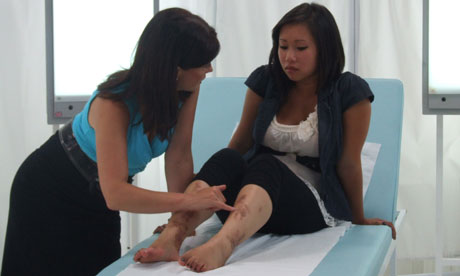
If you've ever seen Embarrassing Bodies – and almost four million people each week watch it – then you will understand the graphic aptness of its title. In among the soaps and sitcoms of primetime Channel 4 it invites members of the public to discuss the lumps and bumps of their most intimate problems with a team of telegenic doctors. And what the volunteers unveil reliably goes far, far, far beyond anything that you would normally see outside the special-interest sections of the internet.
Vibrant skin diseases; genitals, malfunctioning or misshapen; broken bottoms; sexual dysfunction and dissatisfaction – these things are run-of-the-mill. Among my memories of consultations past, it is the abscesses and prolapses that live the longest. When the new series begins on Friday, it promises to introduce us to a woman with two wombs and a man with "a protrusion he has kept hidden for 10 years". Tune in soon to find out where.
Clearly, gawping is why the show remains so popular. It revives the disgusted thrill that many of us remember from our biology textbooks – a thrill very similar to the one that sent 2.6 million viewers to Channel 4 for Britain's Fattest Man, or the one that causes cars to decelerate past traffic accidents. Yet thrilling is not all that Embarrassing Bodies aspire to be. Like Channel 4's childbirth series, One Born Every Minute, this is as much a multimedia crusade as it is a form of entertainment, which raises the question: what does it achieve?
"I think it's very good," says Dr Paula Franklin, director of clinic development at the sexual and reproductive healthcare charity Marie Stopes. "It doesn't shy away from real issues that are a concern to people. It's frank, it's honest, and it presents the information in an accessible way. If you're someone with a real issue, it can be very reassuring that other people have the same or similar concerns to you."
Perhaps a lot of other people, according to figures from Channel 4. In less than four years since Embarrassing Bodies started, more than eight million people have visited the programme's website, where discussions, expert advice, and videos (viewed more than 20m times so far) are all available.
"In this sort of area, people are often reluctant to talk even to friends or relatives about things that they consider to be intensely personal," says Franklin. "The fact that the shows are so visually explicit: I can see that might be upsetting to some people. But it is trying to make people feel that these things can be openly discussed, that it's OK to go to your doctor, and that you'll be treated with respect."
How many people do think that, and for it, are hard to measure. Although anecdotally, of course, the connection has been made. "I do remember somebody coming to me, reporting loss of libido, and saying that they'd seen a particular treatment recommended on Embarrassing Bodies," says Dr Alyson Elliman from the Royal College of Obstetricians and Gynaecologists. Does the show get mentioned often in her surgeries? "Not that frequently. But then again, they might have seen it and not said that was the reason."
While broadly approving of how the show might help set its viewers at ease, Elliman is less sure about its effect on volunteers. (And indeed, it is worth noting that fully 349,785 people are fans of a Facebook group ridiculing them.) "The thing that I'm a bit concerned about is the rather exhibitionistic way in which some people are more than happy to bare all with the television cameras there," she says. Because they might regret it? "I think that's a possibility. But if they're only doing it to make sure that other people don't go through the same anxiety, then that's all to the good."
Dr Ann Robinson, a GP in north London, warns about the dangers of the programme becoming a form of "medical porn". Besides, she adds, the whole focus on embarrassment may be missing the point. "Often what stops young people is that they don't find medical services very accessible. I think that's often the limiting factor, rather than that they don't want to get their penis out. To be honest, we have to worry about what's stopping them coming through the door, not what's stopping them dropping their trousers."
Needless to say, however, it is problems of the trouser-dropping kind that dominate Embarrassing Bodies. "Yes, there is an embarrassment if it's to do with genitals or anal problems," Robinson concedes, "but it's not the only reason people get embarrassed . . . Older people are embarrassed that they've come at all, sometimes, irrespective of what the problem is. And people are often embarrassed to talk about mental health issues."
Maybe for its next crusade, Channel 4 should try Embarrassing Minds.

